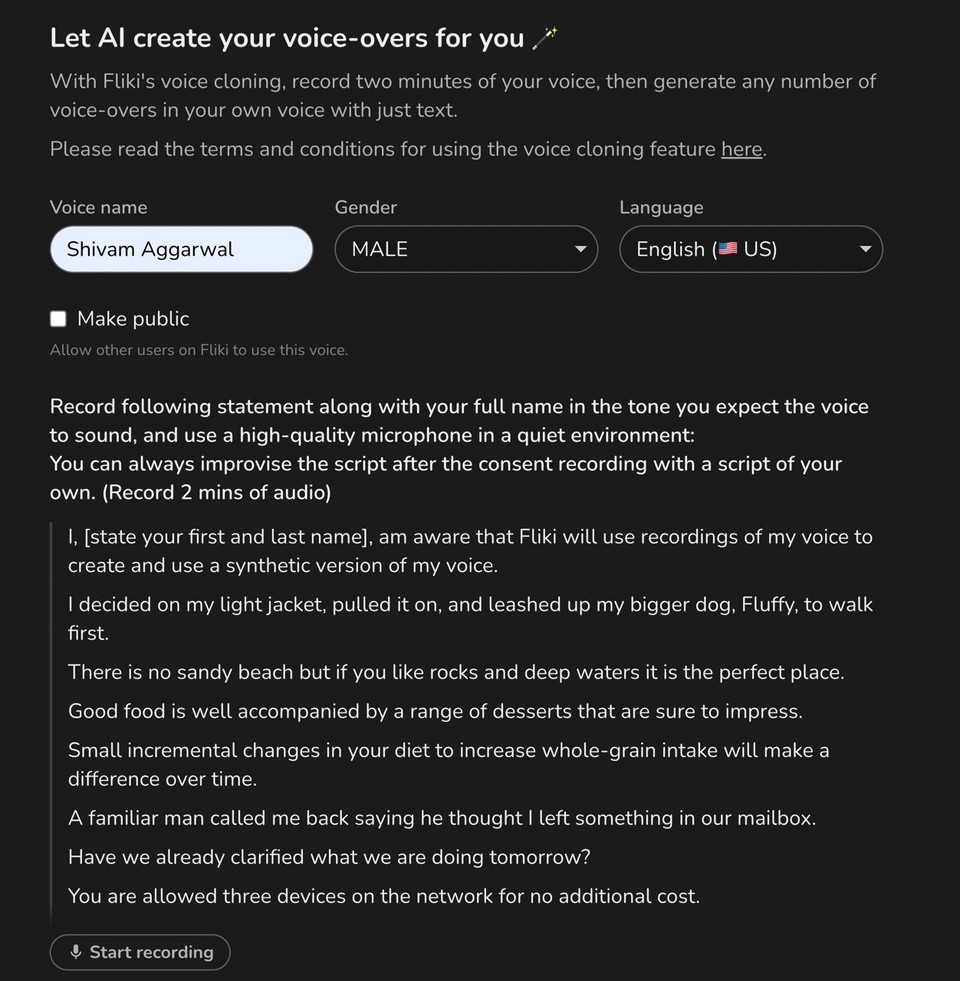Introduction
Technology has become an indomitable force in the ever-evolving landscape of content creation, reshaping how we communicate and connect with our audiences. One such groundbreaking innovation is AI voice cloning - a phenomenon that transcends the boundaries of imagination.
Imagine having the power to replicate your voice with astounding accuracy and utilize it seamlessly across various projects. This blog delves into the fascinating world of AI voice cloning, its ethical implications, and how Fliki, a pioneer in AI text-to-video and text-to-speech generation, is at the forefront of this transformative technology.
Let's embark on a journey to explore the endless possibilities and ethical considerations that AI voice cloning brings to the forefront of modern content creation.

What is AI Voice Cloning?
AI voice cloning is creating a computer-generated voice that mimics the nuances and tones of a real human voice. This technology holds profound importance in content creation by enabling customization and efficiency previously unattainable.
By replicating natural speech patterns, intonations, and nuances, AI voice cloning crafts a digital version of your voice that is virtually indistinguishable from reality. In an era where personalization and productivity are paramount, this technology enables creators to infuse a touch of familiarity into their content, fostering stronger connections with their audience.
As the digital world continues to evolve, the significance of AI voice cloning cannot be overstated—it streamlines processes, accelerates production, and amplifies engagement. Join us as we delve deeper into the realm of AI voice cloning and unravel its transformative impact on the landscape of content creation.
How to Clone Your Voice with AI?
Now that we've uncovered the captivating world of AI voice cloning let's delve into the practical steps of crafting your AI-generated voice. With AI platforms like Fliki at your disposal, the process has never been more accessible. Here's a comprehensive breakdown:
Step 1: Subscription and Prerequisites
Start your journey by subscribing to Fliki's Premium plan, unlocking access to their cutting-edge AI voice cloning feature. Ensure you're in a quiet environment with minimal background noise for optimal recording quality. Utilize a high-quality microphone if available.
Step 2: Voice Configuration
Personalize your AI voice by selecting a suitable name, gender, and language. These choices will define the character of your AI-generated voice. Fliki caters to 30+ language preferences, including American English, French, German, Hindi, Italian, Polish, Brazilian Portuguese, and Spanish. Choose the language that best suits your project's needs.
Step 3: Script Recording
The heart of the AI voice cloning process lies in your script recordings. You'll need to record a sample script with your consent to use your voice to create its synthetic version. Fliki will provide the script in your selected language.

Bonus Tips
To achieve lifelike results, consider these tips:
Ensure your sample script accurately reflects your voiceover's intended tone and style.
Maintain a consistent speaking pace and precise articulation.
Minimize background noise to ensure the highest audio quality.
If possible, use a high-quality microphone for pristine recordings.
Step 4: Approval
After submitting your voice configurations and recordings, the platform's system will review your submission. This approval process typically takes up to 6 hours. Once approved, your cloned voice is ready for use.
By following these steps, you can tap into the capabilities of AI voice cloning, creating personalized, efficient voiceovers for various projects.
Now that you know how to clone your voice with AI, let's delve into the ethical considerations surrounding this technology and the measures to ensure responsible usage.
The Ethics of AI Voice Cloning
💡 Three seconds of audio is sufficient to produce a voice clone with an 85% match to the original.
In exploring AI voice cloning, we must pause and reflect on the ethical landscape accompanying this remarkable technology. As AI increasingly integrates into our creative processes, ethical considerations loom.
1. Ethical Considerations Surrounding AI Voice Cloning
AI voice cloning has ushered in a new era of content creation, but it's not without its ethical complexities. The core ethical concerns revolve around authenticity, privacy, and misuse. The ability to replicate voices with remarkable accuracy raises questions about responsible usage and the potential for abuse.
2. Addressing Concerns about Misuse and Impersonation
One of the primary concerns with AI voice cloning is the potential for malicious actors to misuse this technology for impersonation, fraud, or misinformation. Cloned voices could be employed to deceive, manipulate, or commit identity theft, leading to severe ethical breaches.
3. The Importance of Consent and Transparency
Transparency and consent are paramount in the ethical use of AI voice cloning. Creators should seek explicit consent when using cloned voices, especially in scenarios where the cloned voice is used for commercial or public purposes. Consent ensures that individuals have control over their voice use and prevents unauthorized or unethical voice cloning.

Fliki's Approach to Ethical Voice Cloning
Fliki, as a pioneer in AI text-to-video and text-to-speech generation, recognizes the importance of addressing these ethical concerns head-on. Here's how Fliki approaches ethical voice cloning:
1. Script Approval Process - Fliki implements a rigorous script approval process to ensure that recorded content aligns with ethical guidelines. By vetting scripts, Fliki aims to prevent creating harmful or misleading content that could harm individuals or communities.
2. Ensuring Responsible Usage - Fliki emphasizes responsible usage of its AI voice cloning feature. Users are encouraged to adhere to ethical principles and use the technology for legitimate purposes. It includes refraining from creating content that may incite harm, hate, or misinformation.
3. Monitoring and Enforcement - Fliki actively monitors its platform to detect and prevent unethical or harmful usage of AI voice cloning. Violations of ethical guidelines can result in consequences, such as restricted access or account suspension, to maintain a safe and responsible community of creators.
In the realm of AI voice cloning, ethics play a pivotal role in shaping the responsible use of this powerful technology. As AI continues to evolve, our collective responsibility is to uphold ethical standards and ensure that these innovations enhance, rather than harm, our digital landscape.
The Impact and Future of AI Voice Cloning
As we continue our exploration of AI voice cloning, it's imperative to delve into its profound impact on the present and its promising role in shaping the future of content creation.
1. The Evolving Landscape of AI Voice Technologies
The landscape of AI voice technologies is a dynamic arena characterized by rapid advancements. AI voice cloning represents a pivotal milestone in this journey.
As AI algorithms become more sophisticated and training datasets grow, we can anticipate even more lifelike and versatile voice cloning solutions. The evolution of AI voices is not merely about replication but about enhancing naturalness and expressiveness.
2. How AI Voice Cloning is Reshaping Content Creation
AI voice cloning has already begun to revolutionize content creation across various industries. From advertising and entertainment to education and accessibility, AI-generated voices are becoming invaluable tools.
They allow creators to streamline workflows, reduce production costs, and personalize content unprecedentedly. Voiceovers that once required hours of recording and editing can now be generated with remarkable efficiency, liberating creators to focus on creativity.
3. Future Possibilities and Potential Applications
The future of AI voice cloning is filled with exciting possibilities. Beyond replicating voices, we can expect innovations that enable voice synthesis in multiple languages with even greater accuracy.
AI voice cloning may find applications in virtual reality, gaming, and interactive storytelling, creating interactive experiences that blur the line between virtual realms and reality. Additionally, personalized AI companions with individualized voices could become more prevalent, enhancing human-computer interaction.
4. Balancing Innovation with Ethical Responsibility
As AI voice cloning continues to evolve, balancing innovation and ethical responsibility is crucial. While AI can potentially reshape content creation, we must remain vigilant in addressing ethical concerns.
As creators harness the power of AI voices, it becomes imperative to ensure that these technologies are used responsibly, ethically, and transparently. Upholding ethical standards and safeguarding against misuse should remain at the forefront of AI voice cloning's development.
In summary, AI voice cloning is a testament to artificial intelligence's boundless potential in shaping the content creation landscape. As we navigate this transformative journey, we must do so with a keen eye on both innovation and ethical responsibility, ensuring that the future we build is one where technology enhances the human experience rather than diminishes it.
Conclusion
In our journey through AI voice cloning, we've uncovered a mix of cool tech and essential values. This new technology lets folks make voices that sound real, helping with all sorts of creative stuff.
But there's a catch – we need to use this power wisely. Sometimes, people might use it for the wrong reasons, like pretending to be someone they're not. That's not cool.
Good news: companies like Fliki are doing their part to ensure people use this tech correctly. They check the stuff folks want to record to ensure it's okay. The future of AI voice cloning is bright. It could help us talk in different languages and create amazing adventures. But as we move forward, we must remember to use this power wisely and be kind to each other online.
So, as we wrap up this journey, let's remember that the future is in our hands. We can create amazing things while being good to each other. Here's to a brighter, better tomorrow in digital creativity!



